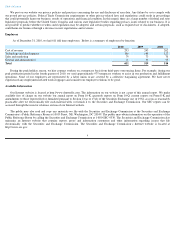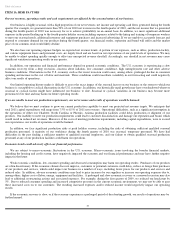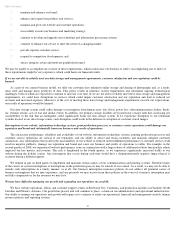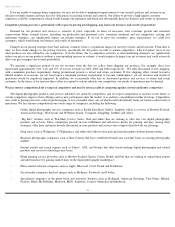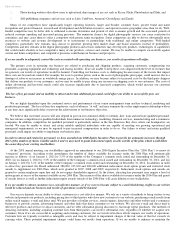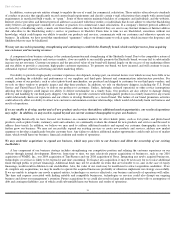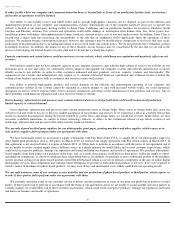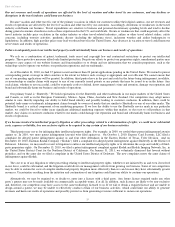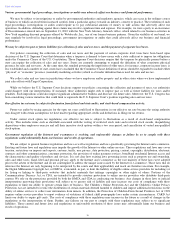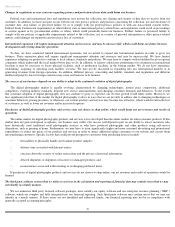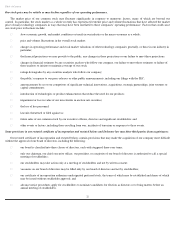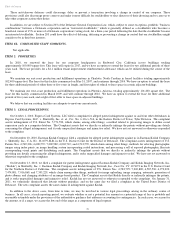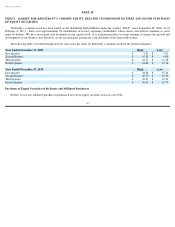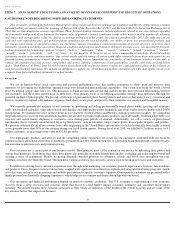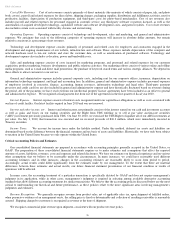Shutterfly 2011 Annual Report Download - page 22
Download and view the complete annual report
Please find page 22 of the 2011 Shutterfly annual report below. You can navigate through the pages in the report by either clicking on the pages listed below, or by using the keyword search tool below to find specific information within the annual report.
Various governmental legal proceedings, investigations or audits may adversely affect our business and financial performance.
We may be subject to investigations or audits by governmental authorities and regulatory agencies, which can occur in the ordinary course
of business or which can result from increased scrutiny from a particular agency towards an industry, country or practice. The resolution of such
legal proceedings, investigations or audits could require us to pay substantial amounts of money or take actions that adversely affect our
operations. In addition, defending against these claims may involve significant time and expense. For example, we were a party to an Assurance
of Discontinuance entered into on September 13, 2010 with the New York Attorney General's office, which related to our business activities in
New York regarding discount programs offered by Webloyalty, Inc., one of our former business partners. Given the visibility of our brand, we
may regularly be involved in legal proceedings, government investigations or audits that could adversely affect our business and financial
performance.
We may be subject to past or future liabilities for collection of sales and use taxes, and the payment of corporate level taxes.
Our policies concerning the collection of sales and use taxes and the payment of certain corporate level taxes have been based upon
decisions of the U.S. Supreme Court that determine when a taxpayer is deemed to have nexus with a state sufficient to impose tax obligations
under the Commerce Clause of the U.S. Constitution. Those Supreme Court decisions require that the taxpayer be physically present before a
state can require the collection of sales and use taxes. States are currently attempting to expand the definition of what constitutes physical
presence for sales and use taxes. At the same time, the standard governing the imposition of other taxes, for instance, corporate income taxes, is
less established and a number of state courts have concluded that the Commerce Clause definition of nexus should be expanded to include either
“physical” or “economic” presence (essentially marketing activities) which is a broader definition than is used for sales and use tax.
We collect sales and use taxes in jurisdictions where we have employees and/or property and in other states where we have implemented
joint sales efforts with Target Corporation.
While we believe the U.S. Supreme Court decisions support our policies concerning the collection and payment of taxes, tax authorities
could disagree with our interpretations. If sustained, those authorities might seek to impose past as well as future liability for taxes and/or
penalties. Such impositions could also impose significant administrative burdens and decrease our future sales. Moreover, the U.S. Congress has
been considering various initiatives that could limit or supersede the U.S. Supreme Court’s position regarding sales and use taxes.
Our effective tax rate may be subject to fluctuation from federal and state audits, and stock-based compensation activity.
Future tax audits by taxing agencies for the open tax years could lead to fluctuations in our effective tax rate because the taxing authority
may disagree with certain assumptions we have made regarding appropriate credits and deductions in filing our tax returns.
Under current stock option tax regulations, our effective tax rate is subject to fluctuations as a result of stock-
based compensation
activity. This includes items such as shortfalls associated with the vesting of restricted stock units and restricted stock awards, disqualifying
dispositions when employees exercise and sell their incentive stock options within a two year period, and cancellation of vested non-
qualified
stock options.
Government regulation of the Internet and e-
commerce is evolving, and unfavorable changes or failure by us to comply with these
regulations could substantially harm our business and results of operations.
We are subject to general business regulations and laws as well as regulations and laws specifically governing the Internet and e-
commerce.
Existing and future laws and regulations may impede the growth of the Internet or other online services. These regulations and laws may cover
taxation, restrictions on imports and exports, customs, tariffs, user privacy, data protection, pricing, content, copyrights, distribution, electronic
contracts and other communications, consumer protection, the provision of online payment services, broadband residential Internet access and
the characteristics and quality of products and services. It is not clear how existing laws governing issues such as property use and ownership,
sales and other taxes, fraud, libel and personal privacy apply to the Internet and e-
commerce as the vast majority of these laws were adopted
prior to the advent of the Internet and do not contemplate or address the unique issues raised by the Internet or e-
commerce. Those laws that do
reference the Internet are only beginning to be interpreted by the courts and their applicability and reach are therefore uncertain. For example,
the Digital Millennium Copyright Act, or DMCA, is intended, in part, to limit the liability of eligible online service providers for including (or
for listing or linking to third-
party websites that include) materials that infringe copyrights or other rights of others. Portions of the
Communications Decency Act, or CDA, are intended to provide statutory protections to online service providers who distribute third-
party
content. We rely on the protections provided by both the DMCA and CDA in conducting our business. Any changes in these laws or judicial
interpretations narrowing their protections will subject us to greater risk of liability and may increase our costs of compliance with these
regulations or limit our ability to operate certain lines of business. The Children’s Online Protection Act and the Children’
s Online Privacy
Protection Act are intended to restrict the distribution of certain materials deemed harmful to children and impose additional restrictions on the
ability of online services to collect user information from minors. In addition, the Protection of Children From Sexual Predators Act of 1998
requires online service providers to report evidence of violations of federal child pornography laws under certain circumstances. CARD Act
limits our ability to expire gift cards. The costs of compliance with these regulations may increase in the future as a result of changes in the
regulations or the interpretation of them. Further, any failures on our part to comply with these regulations may subject us to significant
liabilities. Those current and future laws and regulations or unfavorable resolution of these issues may substantially harm our business and
results of operations.
Table of Contents
18


